 The
VigilanceVoice
The
VigilanceVoice

VigilanceVoice.com
vv
Thursday--
May 16, 2002—Ground
Zero Plus 247
Emergency Room--Hall Of Terror
by
Cliff McKenzie
Editor, New York City Combat Correspondent News
GROUND ZERO, New York City, May 16--I don't watch the
Emmy-winning show, ER. One of the reasons is I didn't
believe the constant madness and crisis was real.
I have changed my viewpoint. Terrorism lives in the Emergency
Room at Saint Vincent's Hospital in New York City. I was
its witness. I affirm its madness.
I was en route to
Ground Zero for my "Crisis of Ordination" confrontation
yesterday morning with my sister and wife. I had
insisted on taking along a wheel chair for my sister, who suffers
from a multitude of leg and ankle problems. I was being
a Sentinel of Vigilance, ready to protect her weak ankles and
legs from the grueling, pounding assault of New York City sidewalks
when it happened.
As I was lifting the wheel
chair, a sharp, nauseating pain rocketed through my chest and
side. I felt the punji-tipped pain spears sinking
deep into my ribs. I gasped. I hoped it would pass
and we began to walk toward Ground Zero. Each step I took
increased the pain until I had to stop.
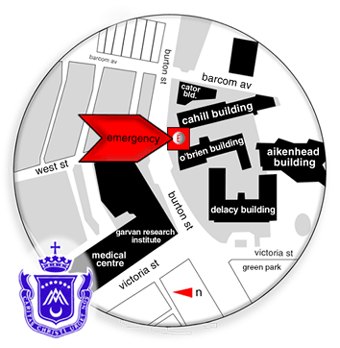 "I have to go to the Emergency Room," I said, holding
on to the side of the wheel chair, my breath short, angry that
my sister's first day of visiting in New York City from Las
Vegas was being spoiled by my sudden painful attack.
"I have to go to the Emergency Room," I said, holding
on to the side of the wheel chair, my breath short, angry that
my sister's first day of visiting in New York City from Las
Vegas was being spoiled by my sudden painful attack.
We took the wheel chair
back to the apartment and climbed in a cab, directing it to
go to Saint Vincent's Hospital. I tried to joke with my
Haitian cab driver who had commented about his own back problems
as I gasped and groaned my way into the cab..
"I was born in March,
a Capricorn," he said in a heavy accent. "I
have much bad luck in my life." When
I asked what was the worst thing that happened, he told me that
he was one day late in payment on his business and the bank
foreclosed, stripping him of his livelihood. Even
though I was in pain, I thought how painful it would be to live
in a country where the rights of the citizens were subject to
losing one's vocation over a 24-hour-default.
"I wish you more good
than bad luck," I said, exiting the cab, trying to keep
my mind off the excruciating pain stabbing at my chest and side
as I moved toward the ER door, assisted by wife and sister.
Everything went orderly,
normal at first.
The waiting room was about
a quarter filled. Some were moaning. One guy had
a patch over his eye, but otherwise it appeared a regular, simple
day of emergency treatment.
A few months earlier I
had been to the ER at Beth Israel with my daughter and her daughter
and knew the drill of waiting and waiting, so I was prepared.
I had my carving tools and a piece of wood with me, but had
no desire to do anything than wait in pain for the relief the
doctors would give me through X-raying and examining me to assure
I hadn't done any permanent damage. At 6-4 and 270 pounds,
the last thing I wanted was a slipped disc. I was hoping
for a stripped and injured muscle.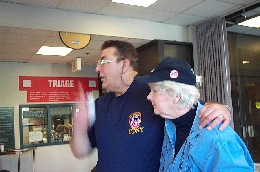
I signed the admission
documents. I didn't read them. I can't imagine anyone
in an ER state-of-mind taking a microscope to what the words
said. I was lucky to scrawl my name. They
attached a wristband with my name and hospital serial number,
my "Band Of ER Courage," and I waited for my name
to be called.
Security at hospitals in
New York is like Fort Knox. Tall, tough-looking
guards in green jackets and sour-expressions guard the doors.
There are buzzers and codes on them that have to be punched
in. No cell phones are allowed.
I thought it ironic that
hospitals have more security than airports. It seemed
a far stretch to imagine a Terrorist walking into an ER with
a bomb strapped to his or her chest, but then I was about to
learn why that was a major possibility. 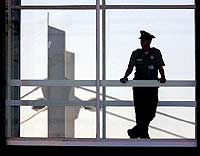
My name was finally called
and I was given security entrance to the bowels of the ER.
Chairs lined the wall where patients sat, and hospital gurneys
were butted up at one end of the chairs with patients lying
on them, some babbling to themselves others reading a newspaper,
some just staring blankly at the ceiling.
A young woman, a Physicians
Assistant, examined me. She checked my back for
disc pain and took my history, then told me they would give
me a shot for the pain and take X-rays. She told
me to wait.
I was sitting on a chair
in the ER room. A woman next to me was telling a social
worker about how she was beaten by her husband. Another
woman across the way was bleeding from her nose, some after-effect
of an operation. Blood stained her blouse and she pressed
a huge icepack against her nose. Next to me, on
my left, an older black woman who was blind had a huge lump
protruding from her jaw, a blocked sebaceous gland, the PA said.
I could see it throbbing on her jaw, as though she had a huge
wad of cotton stuffed in her mouth. Her husband stood
Vigilantly with her.
I sat there for over an
hour. I listened to the madness and disorder of the room.
Nurses yelling at one another. Doctors arguing.
It seemed every member of the staff was mad, in conflict with
one another. It wasn't like the movies or
TV. programs where everyone is harmonized in the madness of
the moment, all for one and one for all. This seemed to
be "every-man-for-himself" management.
Unable to find any pain reliever
medication for me as they fished through a drawer,
they told me to go get my X-Rays. An older woman
led me down the cluttered hall. 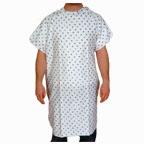 Another nurse told her to tie my hospital robe and they had
a huge argument over who was in charge of me. I stood
there between them, wondering if this was a joke or for real.
It was for real.
Another nurse told her to tie my hospital robe and they had
a huge argument over who was in charge of me. I stood
there between them, wondering if this was a joke or for real.
It was for real.
"She's always trying to
tell me my job," the woman told me. "I've worked
here for thirty years, what does she know."
I didn't respond. I shuffled
slowly, painfully toward the elevator.
Again, I waited upstairs for
someone to come get me for an X-Ray. It seemed I
was invisible. Finally my name was called and I
groaned and grimaced and made my way behind the large, hulking
shaped Jamaican woman who was my X-Ray tech. She limped
as she walked, and I wondered if she had been afflicted with
what I had for she seemed to be in more pain than I. I
said nothing. Jokes seemed inappropriate.
Because of my size, they cross
X-rayed me. I stood for a series of X-rays of my
front and side, and then they had me lie on a table and began
to take a series of additional pictures. Each time
I moved the pain shot through me. I could hear people
laughing and joking and telling stories about their lives in
the adjoining film processing room. It seemed that
patients were flies on the walls, interposing themselves between
the lives of the staff, necessary evils to their existence and
conversations.
I was told to wait for
someone to take me back down to the ER. My X-ray
tech shouted to the people at the desk who were talking to one
another that I needed an escort. They said nothing.
I sat for about a half an hour, just about ready to waddle myself
to the elevator and go down to the ER solo when someone came
by and was told I needed to go back to the ER. I was worried
because my X-rays hadn't been read yet. It was nearly
2 p.m. and I had arrived at the ER at 11:00 a.m.
The ER was filled with people
when I returned. There was one chair left. I eased
myself down and leaned back against the wall. 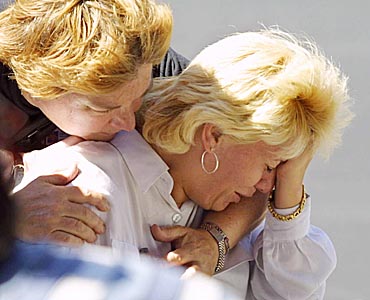 The
sounds of moans served as a chorus to the shouts and barking
of the nurses and doctors working on people. I tried
not to pay attention to the chaos. I just wanted my X-rays
read, a prescription for the pain, and to leave.
The
sounds of moans served as a chorus to the shouts and barking
of the nurses and doctors working on people. I tried
not to pay attention to the chaos. I just wanted my X-rays
read, a prescription for the pain, and to leave.
Then all hell broke loose.
First, two Port Authority cops
entered with a prisoner to get him treatment. He had a
black eye and appeared to bleeding from the head.
He was a huge guy, with thick shoulders and a barrel chest.
The two cops were small and slight. I figured the prisoner
could take them both with one punch.
Up to that point I assumed the
ER stories on television and the movies were manufactured drama.
The hallway had been quiet, almost sedate. But now
the reality of madness was unfolding.
Inside the treatment room a man
started cursing the nurses and doctors, refusing to take off
his shirt, yelling the "F"-word at everyone and demanding
to be released, to exit. Four security guards rushed
into the room. .jpg) A confrontation was growing. I was going to stand and
peer inside but decided if there was a scuffle I might get bowled
over, and add to my injury. So I just listened as the
guards refused to let the man leave and told him they would
strip him if he didn't do it himself.
A confrontation was growing. I was going to stand and
peer inside but decided if there was a scuffle I might get bowled
over, and add to my injury. So I just listened as the
guards refused to let the man leave and told him they would
strip him if he didn't do it himself.
I was perplexed.
It was as though I were in a jail, and all individual rights
had been left at the security door. Part of me wanted
to jump up to the man's defense, but I bit my tongue.
The pain and need for relief overpowered by righteous indignation.
More people poured into the narrow
hallway. A tall, lanky woman, perhaps in her twenties
or early thirties stood bobbing her head, intermittently laughing
and then twitching and grumbling. She was pale and
pasty, appearing like a drug addict coming down. Her sister
accompanied her, trying to soothe her. She was given
hospital gowns and told to remove her clothes and wait to be
called.
She and her sister found a seat
next to me. I overhead her conversations with her sister.
She was complaining about the long wait, bobbing in and out
of hysterical laughs and depressive anger. She kept
insisting she wanted a cigarette and finally pulled one out.
I thought she was going to light up right there. She kept
saying the "F" word in relation to the hospital, the
staff and the long, grueling wait. Finally she bolted
from her chair and rushed out the security door to the entrance
where she could smoke. A doctor yelled at the security
guards, all of whom were crowded around the man who wouldn't
take off his shirt, that a patient was outside smoking.
Two guards rushed out the
security doors. The girl was forced back inside.
She told the guards to keep their hands off her and began to
scream and kick and swing her fists at them, yelling she wanted
to leave, to get the "F" out of there.
Four guards tried to restrain
her. She thrashed at them, screaming madly at the top
of her lungs. A nurse rushed out with a syringe and long
needle and injected her with some tranquilizing drug.
The girl slumped into a rag doll and was dragged back to her
seat next to her sister, next to me, her head lolling.
It wasn't over yet.
The calm had brewed into a storm, far beyond anything I had
seen on television or the movies, far more real than fiction
could paint.
Against the wall stood a young
Hispanic woman with her mother. The woman's hands were
all twisted into a deformed claw and her fingers twisted and
twitched as she stared vacantly about, seemingly unaware of
the cacophony around her.
The sister sitting next to me
stood up. The nurse told the young Hispanic woman to sit
down. Her mother was pressed up against the wall, standing,
quietly assuming the position of wallpaper. I stood and
offered the mother my chair next to her daughter. She
graciously accepted.
It was nearing 3 p.m., five hours
since I had arrived. I wanted the PA to see me, hoping
she would read my X-rays and let me leave the Snake pit the
hall had become.
Then Nurse Ratchet, or one that
looked like the infamous nurse from One Flew Over The Cuckoo
Nest, appeared. 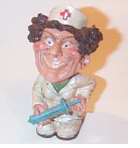 She began to tell other nurses about the paranoid schizophrenic
patients in the hall. She spoke in a loud, coarse Voice,
as though the patients were suspended in time, talking about
each one and pointing at them as she warned the other nurses
to "keep an eye on them." One she singled out
was the young Hispanic girl with the twitching, twisted hand
and vacantly frightened stare just three feet away from her.
I wondered about the ethics of demeaning patients' conditions
in front of them and other patients. I wondered about
the Terror the alleged "angels of mercy" were injecting
into the mind of the young girl, shoveling more trauma on an
already disturbed soul.
She began to tell other nurses about the paranoid schizophrenic
patients in the hall. She spoke in a loud, coarse Voice,
as though the patients were suspended in time, talking about
each one and pointing at them as she warned the other nurses
to "keep an eye on them." One she singled out
was the young Hispanic girl with the twitching, twisted hand
and vacantly frightened stare just three feet away from her.
I wondered about the ethics of demeaning patients' conditions
in front of them and other patients. I wondered about
the Terror the alleged "angels of mercy" were injecting
into the mind of the young girl, shoveling more trauma on an
already disturbed soul.
Later, I was to learn her
hands were the result of too many psychotropic drugs, a common
condition for those who live a drugged existence to counterbalance
their terror.
Then the young black man
a few seats to my left yelled at the security guards to let
the "F"-ing man who didn't want to take his shirt
off leave. He began to yell at all the ER staff,
especially Nurse Ratchet who told him to not use that kind of
language.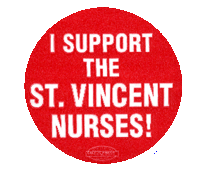
He was a well dressed,
educated young man who was exasperated. He began to tell
Nurse Ratchet how disorganized and confused the management of
the ER room was.
Taking umbrage, Nurse Ratchet
began to defend the ER, and told the man that his attitude was
not the kind of attitude that would get him treated in a timely
fashion. He retorted that he had been there for five hours,
and had a lacerated eye, and no one had seen him yet and that
he was pissed.
Then he pulled out his
cell phone--a violation--and dialed a number. Nurse Ratchet
called security. The guards rushed at the young man.
"I'm calling the local television station to come down
here and film this insanity," the man said. "This
is madness."
The security guards
started to take the phone away and the young man closed it and
stuck it in his pocket. Nurse Ratchet told the young man
to stop yelling, which he wasn't, and that if he wanted to be
treated he would be nicer.
I wanted to vomit.
But, more importantly, I wanted to leave.
Next to the young
man was an older woman with Alzheimer's Disease, accompanied
by her friend. The older woman was disoriented.
They had been waiting for over four hours.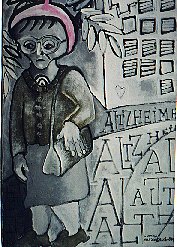 The older woman's companion had had enough. She took her
ailing, fragile friend by the hand and tried to coax her up
and out.
The older woman's companion had had enough. She took her
ailing, fragile friend by the hand and tried to coax her up
and out.
"We have to
leave," her friend said. "They are too busy
here. We are not waiting any longer."
"But...but...I
want to stay," the older lady cried..."I don't want
to go...I want help..."
"They can't help you
here...they are too busy..." her companion said, her Voice
frustrated, the idea of sitting there for hours upon hours more
oppressive than the trauma of leaving.
Finally, my PA appeared
with my X-rays. She put them up on the viewer and
I began to ask her questions and then realized she wasn't a
doctor, and was probably not yet thirty. I realized
the insanity of me expecting her to know details of my problem,
or to read the picture of my lungs. I still smoke, and
wanted the X-rays for a look at my damage, if any, as well as
the signs of torn ligaments and muscles.
I choked off my questions.
Took my prescriptions and left. I glanced back at the
room before I exited the security doors, at the rows of people
waiting, at the young Hispanic woman's hands twitching, at the
black man's angry face and lacerated eye, at the lolling head
of the woman who had been tranquilized, at the security guards
lingering near the treatment door where the man who refused
to take off his shirt still threatened to erupt.
That evening I told the story
to my wife. As a hematologist, she had worked in many
ER situations. I was perplexed at the militaristic
stripping of people's rights in the ER room, and told her about
my siding with the patients who abhorred the treatment of the
other patients.
"That release you signed,
Cliff, remember it?" she queried.
"Yes."
"It gives the hospital total
rights over your body. When you enter an ER, you give
up personal rights. 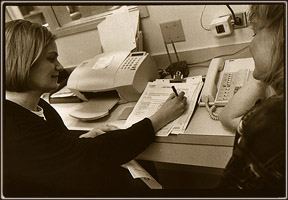 You
go under their command, control. It's like you enter
there for help, and when the help is offered and you resist,
you lose the right of choice. Lots of people walk into
an ER and then fight the treatment. So hospitals protect
themselves. They assume you want help or you wouldn't
sign a release."
You
go under their command, control. It's like you enter
there for help, and when the help is offered and you resist,
you lose the right of choice. Lots of people walk into
an ER and then fight the treatment. So hospitals protect
themselves. They assume you want help or you wouldn't
sign a release."
I thought about it.
It made sense. But it didn't make sense.
Years ago my wife had been knocked
out by a patient she was drawing blood from--a sheriff who was
unconscious and when he awoke to a needle in his arm--slugged
my wife and knocked her across the ER room. It was reflex,
not intentional.
Still, it seemed I had been in
a Hall of Terror. It seemed to me the rights of
command over the patients had been exaggerated at their expense.
I saw no justification
for the way in which those people were treated, especially the
authoritarian Terrorist attitude taken by the employees.
But this was a Triage treatment center, in the heart of New
York City. What did I expect.
Still, I thought especially
of the young Hispanic woman with the deformed fingers.
I thought of her being driven deeper into her dark inner sanctum
by the "angels of Terror" who spoke about her in such
demeaning terms.
On the obverse, I thought
of the Alzheimer's patient and her companion, who quietly sat
for hours--two old ladies seeking solace--in a world that paid
no heed to them, and gave them no solace for their pain.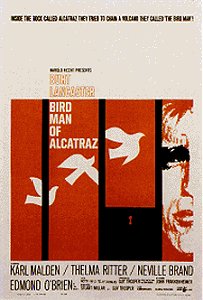
As I left with my sister
I took a deep breath outside. I felt like the Birdman
of Alcatraz who stepped out of the cold walls of a prison in
which all my rights had been exsanguinated, into the warmth
of freedom.
"How'd it go,"
my sister asked.
"I'll tell you later,"
I replied. "Right now I want to smell freedom."

G0
TO: May 15--Crisis of Ordination


 "I have to go to the Emergency Room," I said, holding
on to the side of the wheel chair, my breath short, angry that
my sister's first day of visiting in New York City from Las
Vegas was being spoiled by my sudden painful attack.
"I have to go to the Emergency Room," I said, holding
on to the side of the wheel chair, my breath short, angry that
my sister's first day of visiting in New York City from Las
Vegas was being spoiled by my sudden painful attack.

 Another nurse told her to tie my hospital robe and they had
a huge argument over who was in charge of me. I stood
there between them, wondering if this was a joke or for real.
It was for real.
Another nurse told her to tie my hospital robe and they had
a huge argument over who was in charge of me. I stood
there between them, wondering if this was a joke or for real.
It was for real. The
sounds of moans served as a chorus to the shouts and barking
of the nurses and doctors working on people. I tried
not to pay attention to the chaos. I just wanted my X-rays
read, a prescription for the pain, and to leave.
The
sounds of moans served as a chorus to the shouts and barking
of the nurses and doctors working on people. I tried
not to pay attention to the chaos. I just wanted my X-rays
read, a prescription for the pain, and to leave..jpg) A confrontation was growing. I was going to stand and
peer inside but decided if there was a scuffle I might get bowled
over, and add to my injury. So I just listened as the
guards refused to let the man leave and told him they would
strip him if he didn't do it himself.
A confrontation was growing. I was going to stand and
peer inside but decided if there was a scuffle I might get bowled
over, and add to my injury. So I just listened as the
guards refused to let the man leave and told him they would
strip him if he didn't do it himself. She began to tell other nurses about the paranoid schizophrenic
patients in the hall. She spoke in a loud, coarse Voice,
as though the patients were suspended in time, talking about
each one and pointing at them as she warned the other nurses
to "keep an eye on them." One she singled out
was the young Hispanic girl with the twitching, twisted hand
and vacantly frightened stare just three feet away from her.
I wondered about the ethics of demeaning patients' conditions
in front of them and other patients. I wondered about
the Terror the alleged "angels of mercy" were injecting
into the mind of the young girl, shoveling more trauma on an
already disturbed soul.
She began to tell other nurses about the paranoid schizophrenic
patients in the hall. She spoke in a loud, coarse Voice,
as though the patients were suspended in time, talking about
each one and pointing at them as she warned the other nurses
to "keep an eye on them." One she singled out
was the young Hispanic girl with the twitching, twisted hand
and vacantly frightened stare just three feet away from her.
I wondered about the ethics of demeaning patients' conditions
in front of them and other patients. I wondered about
the Terror the alleged "angels of mercy" were injecting
into the mind of the young girl, shoveling more trauma on an
already disturbed soul.
 The older woman's companion had had enough. She took her
ailing, fragile friend by the hand and tried to coax her up
and out.
The older woman's companion had had enough. She took her
ailing, fragile friend by the hand and tried to coax her up
and out. You
go under their command, control. It's like you enter
there for help, and when the help is offered and you resist,
you lose the right of choice. Lots of people walk into
an ER and then fight the treatment. So hospitals protect
themselves. They assume you want help or you wouldn't
sign a release."
You
go under their command, control. It's like you enter
there for help, and when the help is offered and you resist,
you lose the right of choice. Lots of people walk into
an ER and then fight the treatment. So hospitals protect
themselves. They assume you want help or you wouldn't
sign a release."

